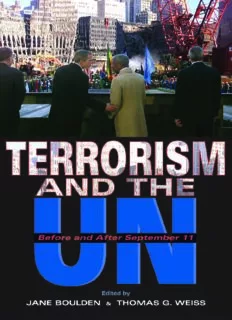
Terrorism and the UN: Before and After September 11 (United Nations Intellectual History Project) PDF
Preview Terrorism and the UN: Before and After September 11 (United Nations Intellectual History Project)
Terrorism and the UN Terrorism and the UN Before and After September 11 Edited by Jane Boulden and Thomas G. Weiss Indiana University Press Bloomington and Indianapolis This book is a publication of Indiana University Press North Morton Street Bloomington, Indiana - USA http://iupress.indiana.edu Telephone orders -- Fax orders -- Orders by e-mail [email protected] © by Indiana University Press All rights reserved No part of this book may be reproduced or utilized in any form or by any means, electronic or mechanical, including photocopying and recording, or by any information storage and retrieval system, without permission in writing from the publisher. The Association of American University Presses’ Resolution on Permissions constitutes the only exception to this prohibition. The paper used in this publication meets the minimum requirements of American National Standard for Information Sciences—Permanence of Paper for Printed Library Materials, ANSI Z.-. Manufactured in the United States of America Library of Congress Cataloging-in-Publication Data Terrorism and the UN : before and after September / edited by Jane Boulden and Thomas G. Weiss. p. cm. Includes index. ISBN --- (cloth : alk. paper) — ISBN -- - (pbk. : alk. paper) . Terrorism—Prevention—International cooperation. . United Nations. . War on Terrorism, – . World politics—1995–2005. I. Boulden, Jane, date II. Weiss, Thomas George. HV.T '.—dc In memory of those who gave their lives working for peace at United Nations Headquarters Baghdad, Iraq August 19, 2003 Contents August 9, ix Acknowledgments xi List of Abbreviations xiii Part I. Framing the Debate 1 Whither Terrorism and the United Nations? Jane Boulden and Thomas G. Weiss 2 Charter Values and the Response to Terrorism S. Neil MacFarlane Part II. The “New” International Arena 3 September and Challenges to International Law Nico Schrijver 4 The U.S., Counterterrorism, and the Prospects for a Multilateral Alternative Edward C. Luck 5 Improving the International Response to the Transnational Terrorist Threat Karin von Hippel 6 The Inherent Difficulties of Interinstitutional Cooperation in Fighting Terrorism Thierry Tardy Part III. The World Organization Responds to Terrorism 7 The Role of the Security Council Chantal de Jonge Oudraat vii viii Contents 8 Using the General Assembly M. J. Peterson 9 The Political Economy of Terrorism Mónica Serrano 10 The Root Causes of Terrorism and Conflict Prevention Rama Mani About the Contributors Index August 19, 2003 Having been prompted by the terrorist attacks of September , , and then completed in the midst of the Security Council debate on Iraq, this book goes to press only a few days after the tragic bombing of the UN headquarters in Baghdad on August , . The perils of unilateralism and multilateralism have been starkly presented in the events following the declared “end” of the War in Iraq on May , . The aftermath of this war has demonstrated that while U.S. power may be an order of magnitude greater than that of any other state at present, that power has limits. It also demonstrates that these concepts are not as mutually exclu- sive as they may seem. Global security problems require global solutions. It is beyond the capability of any actor, even the remaining superpower, to tackle problems by going it alone. Transnational security problems require multi- lateralism. In our introduction, we suggest that the events surrounding Iraq are “quite separate” from the UN’s role in dealing with terrorism. The bombing in Baghdad has effectively eliminated most of that separateness. The fact that the division of labor between the non-UN-authorized “coalition” forces and the United Nations was clear (by both UN choice and U.S. design), and that the UN’s presence was oriented toward helping the Iraqi people meant little to the forces that determined that terrorist tactics would help achieve their ends. Indeed, it may be the very constructive and humanitarian nature of the world organization’s activities that made it such a target. There is a bitter irony in this fact, but it is an irony that is precisely indicative of the inherent complexity and pernicious nature of terrorism. The Baghdad bombing presents the United Nations with an extraordinar- ily difficult dilemma with implications that extend well beyond its role in Iraq. A retreat behind fortified walls and a failure to confront the source of the threat is a de facto victory for terrorists. Plowing ahead without taking protective measures may result in more attacks. Either option contains within it the likelihood that the accessibility and efficacy of the world organization will be limited and, perhaps, even undermined. One of our starting points in undertaking this book was the assumption that as the institution mandated ix
Description: